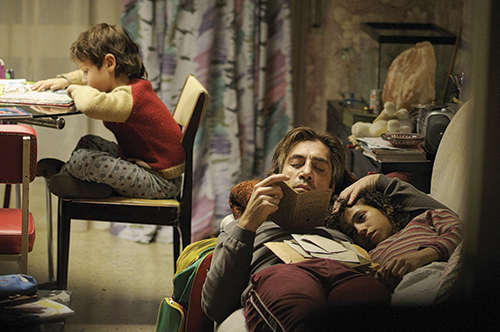I have to admit I was initially a little skeptical of Alejandro Gonzalez Inarritu’s 2010 film Biutiful just because of all the whispering. The film has tons of it, starting with the opening scene, which turns out to be a transcendent framing device for the story of psychic hustler and single dad Uxbal and his quest to save his two young children, Ana and Mateo, before he dies of cancer.
Signs of the father

I have to admit I was initially a little skeptical of Alejandro Gonzalez Inarritu’s 2010 film
Biutiful just because of all the whispering. The film has tons of it, starting with the opening scene, which turns out to be a transcendent framing device for the story of psychic hustler and single dad Uxbal and his quest to save his two young children, Ana and Mateo, before he dies of cancer.
Pretention tends to chase me away from things. I think Terence Malick. I panic.
Biutiful, however, is much more than the sum of its parts. I have to admit that I’m not a big Coen Brothers fan, and I never saw No Country for Old Men, but I am familiar with Javier
Bardem’s work, and I think he deserves praise as a soulful and ferocious actor.
I non-ironically loved him in Woody Allen’s Vicky Cristina Barcelona, and the contrast between the way that movie depicts Barcelona and the way Biutiful depicts it is striking.
We’re used to seeing an incredibly idyllic, romantic city full of picturesque beaches and Gaudi architecture, the way American girls like Allen’s Vicky and Cristina would see Barcelona.
In Biutiful, Inarritu takes us right to the slums, where Bardem’s impoverished Uxbal struggles to support his two young children by acting as a middleman between Chinese and African immigrants. This Barcelona is almost shockingly bleak, full of desperation and sadness that reflects solemnly in Bardem’s amazing eyes.
I remember this film being universally loved, but in hindsight the reviews were mixed. It’s Bardem’s performance that makes it worth seeing, though there are moments of quiet eloquence in Inarritu’s screenplay that evoke themes of spirituality, fatherhood and what it means to do the right thing.
Uxbal makes extra money communing with the dead, and as he moves closer to confronting his own death the film becomes increasingly surreal and fixated on the notion of what it means to be a good man.
Biutiful costars Maricel Alvarez as Marambra, Uxbal’s unstable and manipulative estranged wife, whom he realizes is entirely unfit to care for Ana and Mateo after his death, and Cheikh Ndiaye and Diaryatou Daff as Ekweme and Ige, an African couple he befriends.
The film clocks in at more than 2 1/2 hours of nearly unrelenting misery coupled with some gorgeous cinematography. At one point, we’re looking at a pristine stretch of beach beneath tourist resorts that is littered with dead Chinese workers.
I don’t know why, but this film put me in mind of Don Draper’s speech on last week’s Mad Men about how the love you’re supposed to have for your children comes later, when they do something unexpected and you realize you now feel how you were pretending to feel before.
Uxbal is the virtual opposite of Draper as a character—an inherently decent man trying to do the right thing in horrible circumstances instead of an inherently flawed man doing the wrong thing in fairly glamorous circumstances.
But these modern portraits of fathers are intriguing. Where is the line between protection and love? What influences the type of people Ana and Mateo become?
It seems fitting that the last segment of the film is devoted to Uxbal’s interaction with his elder child, Ana, who is played by the young actress Hanaa Bouchaib.
He begs her to remember him, and the myriad emotions reflected in Bardem’s face keep the moment from ever feasibly being detached, as if the actor is single-handedly embodying
Biutiful’s emotional core. Then we circle back to the beginning and he gives her his mother’s diamond ring.
Uxbal’s own long-dead father lends himself to the idea of the father figure as a sort of mythical specter, a protection almost destined to slip away from you as it did from Uxbal and as it will for Ana and Mateo.
Biutiful
Friday, May 3, and Saturday, May 4, at 7 and 10 p.m.
Sunday, May 5, at 3 p.m.
510 SW Hall St.
$3 general, free for students
Their lives will not be much easier because of Uxbal’s actions, but they will survive, and he might have correctly assumed that the real value of his life will be that Ana goes through hers remembering the depth of his love for his children. It’s no coincidence that Inarritu dedicated the film to his own father.
Biutiful is at times heavy-handed and morose, and it is probably much too long, but it’s also undeniably moving. Having lost my own father, the themes resonated strongly with me, and I’m ready to proclaim it less pretentious than quietly devastating.
The film also gave me a newfound respect for Javier Bardem, who might be one of the greatest actors working today. In the mystical underworld of the Barcelona slums, Inarritu and Bardem manage to create something truly beautiful after all.





